With a rich history steeped in diverse influences, one of the defining features of Greek cooking is the emphasis on communal dining. You will surely experience exceptional hospitality and delicious meals packed with flavour wherever you travel around Greece.
Welcome To Greece
Although Greece is less renowned for being vegan-friendly than other European countries, you will soon discover more plant-based options in Greek cuisine.
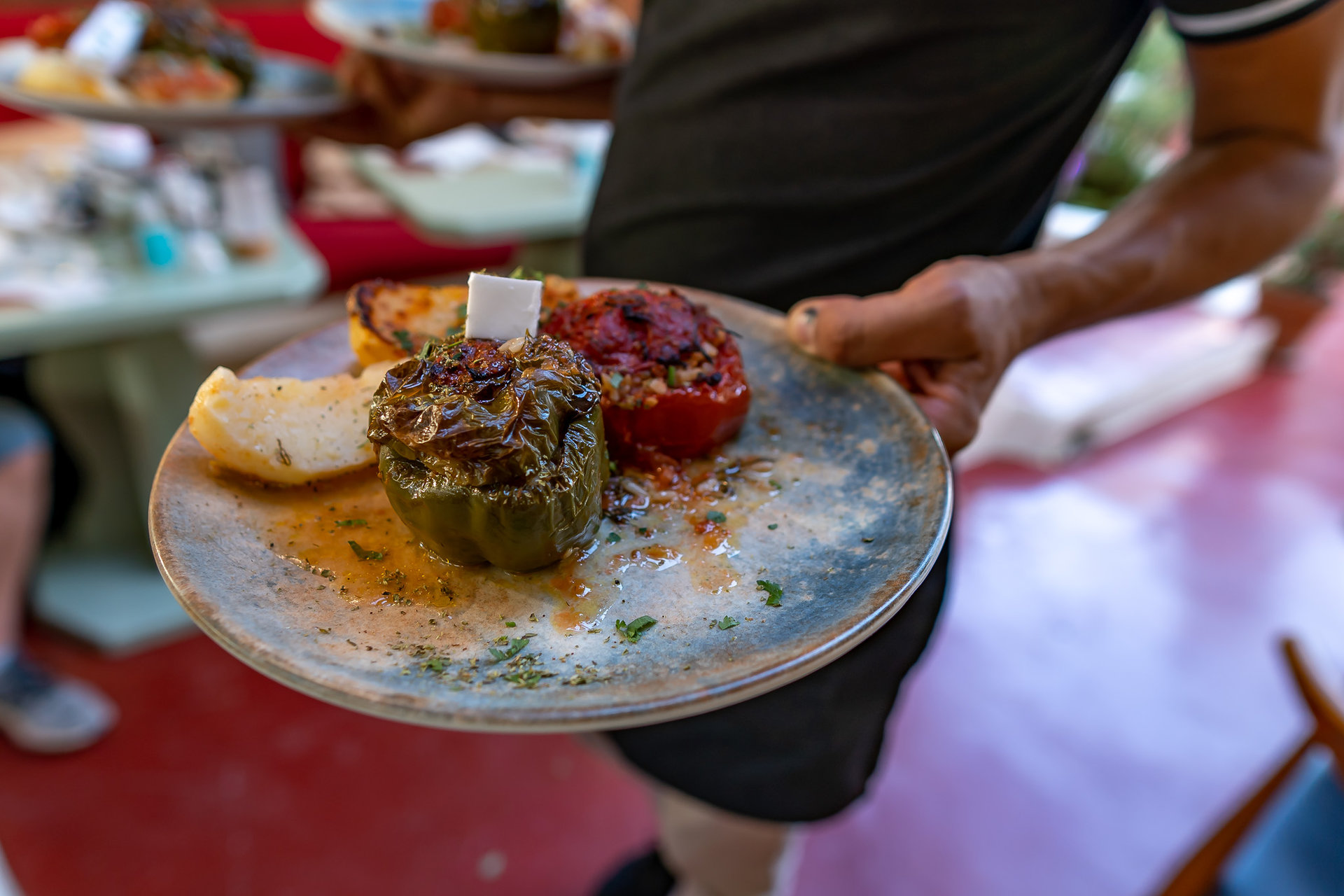
The widely popular Mediterranean diet is focused primarily on fresh plant-based produce. Vegetables are often served as part of the main course and are featured in side dishes, salads, pastries and garnishes.

A Brief History Of Greek Cuisine
Greece is located south of the Balkan Peninsula and boasts the longest coastline in Europe. Greek food has a rich history influenced by Italian, Mediterranean, Middle Eastern and Ottoman cuisines. For centuries, Greek cuisine has been known for its fresh ingredients, simple and seasonal flavours, and an emphasis on olive oil and vegetables. Today, the food scene incorporates fresh produce to create a balanced and healthy range of popular dishes worldwide.
The Mediterranean style of eating is commonly found in coastal areas such as Greece, Spain and Italy and includes a variety of plant-based ingredients and whole foods. Healthy fats, whole grains, fruits, vegetables, legumes, and nuts are part of the daily diet, and there is only moderate consumption of fish, meat and dairy. The most important aspect of this style of food is that it is social, and food is enjoyed outside with family and friends. Enjoying a meal in Greece is essential; you will surely experience this and more as you travel the region.
Byzantine cuisine evolved through Roman, Greek, Persian, and Middle Eastern influences. It was based on vegetables, grains, fruit, olives, pulses, and porridge. Ingredients such as vinegar, honey, figs, oranges, lemons, capers, olives, and walnuts were used in traditional meals.
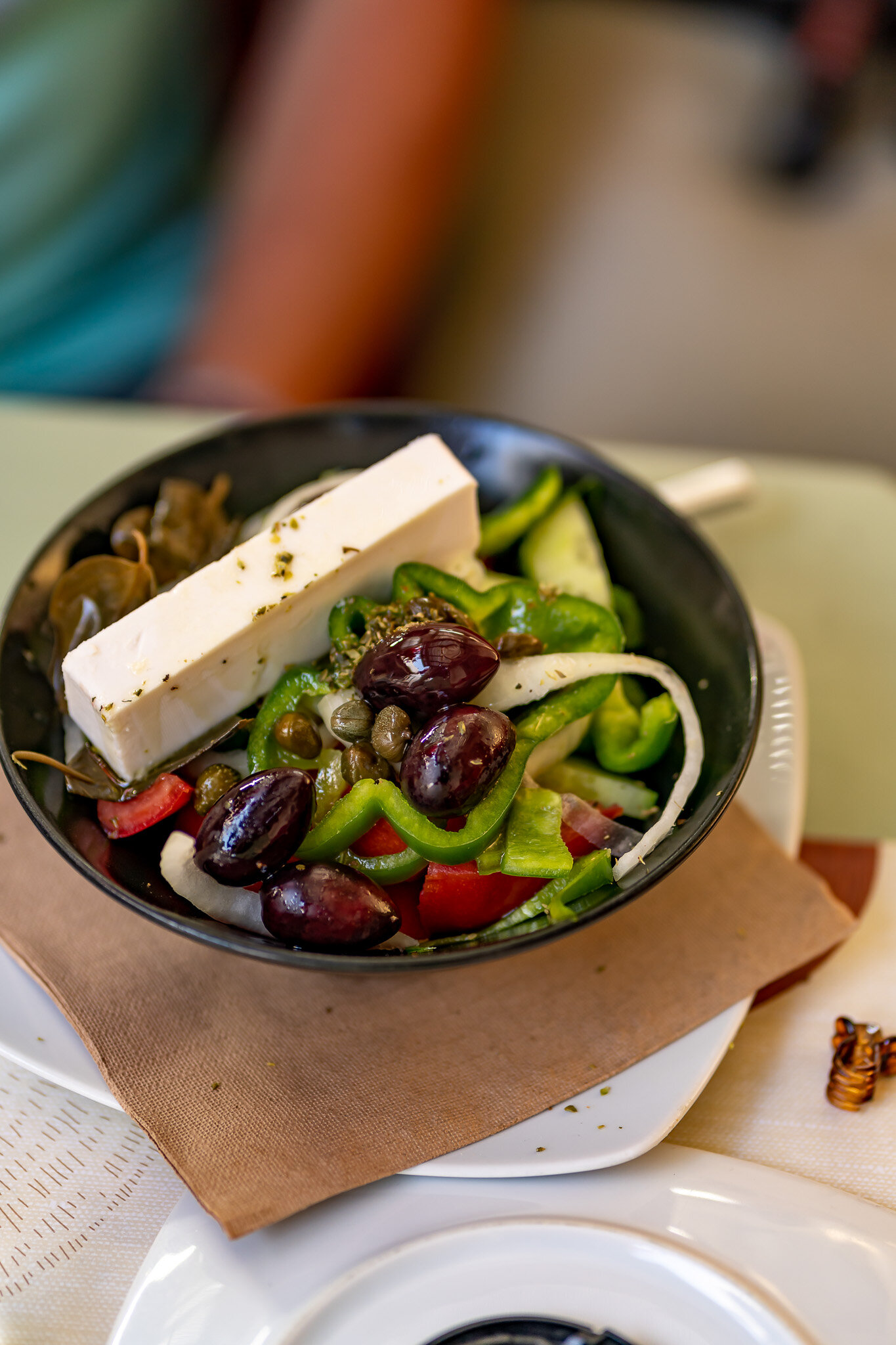
Did you know there are multiple fasting periods each year in Greece due to the Orthodox Liturgical calendar? These include dates where specific fasting rules must be observed and require abstinence from meat, dairy, fish and sometimes oil. Orthodox Christians observe around 40 days of fasting from specific foods before Lent and will observe approximately 180-200 days of fasting restrictions per year. Followers of the Eastern Orthodox Christian Church will avoid olive oil, fish, meat and dairy products every Wednesday and Friday.
During fasting periods, a primarily vegetarian diet is permitted, and the main food groups consumed are vegetables, fruits, bread, legumes, nuts, seeds, and certain types of seafood. For this reason, many are familiar with a vegetarian diet and understand fresh produce’s critical role in achieving optimal health.
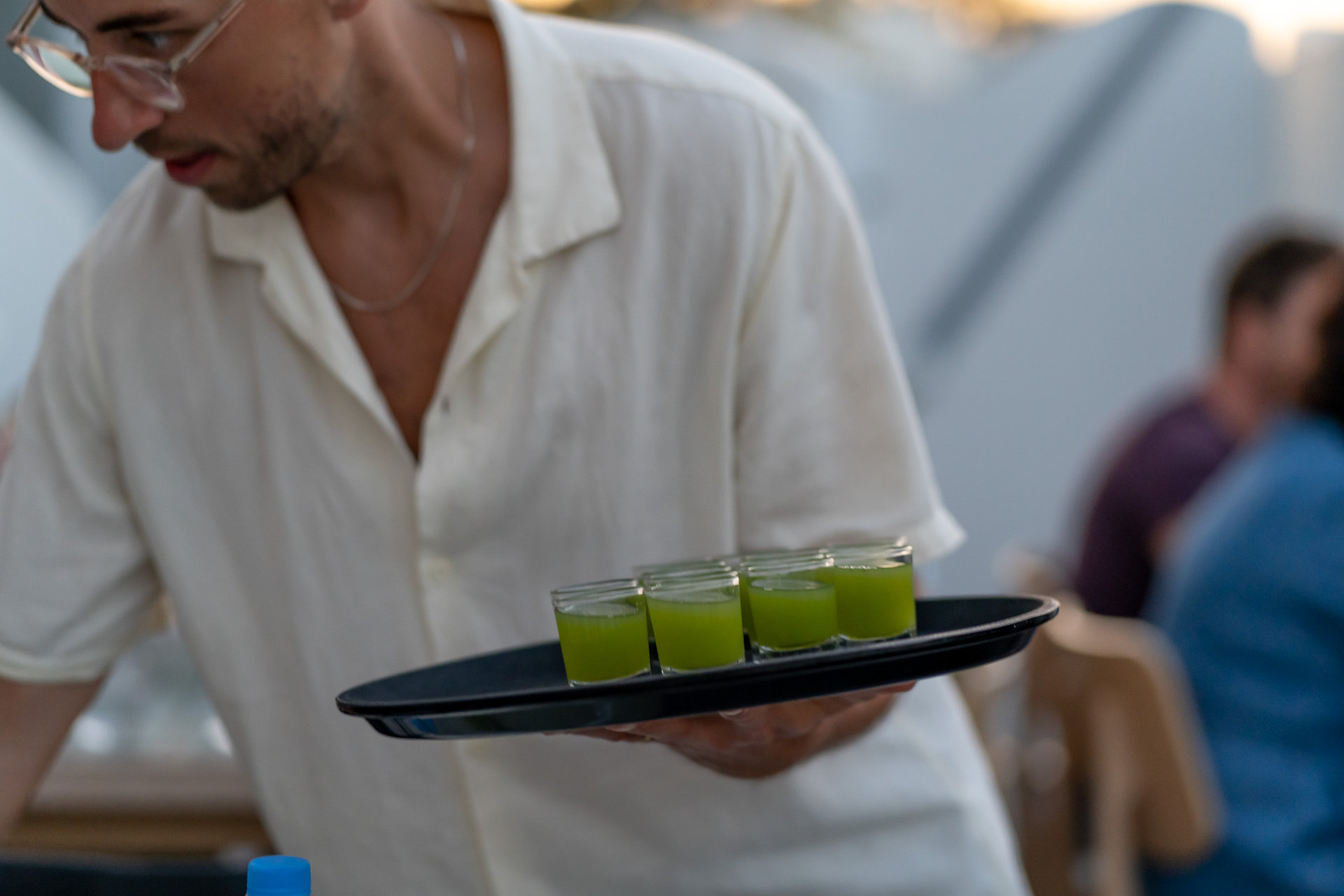
Vegan Food In Greece
There are several accidentally vegetarian and vegan dishes in Greek cuisine, and much of the diet is centred around fresh and seasonal produce. Supermarkets stock a range of vegan options, and cafe menus are increasing their vegan-friendly options. One of the cornerstones of vegan cuisine in Greece is the abundant use of olive oil as a staple ingredient in a wide array of traditional dishes. Aside from the classic olive oil, legumes and grains accompany fresh salads and vegetables. Aside from a few non-vegan ingredients typically found in traditional Greek dishes, you can find many accidentally vegan options on your travels.
Vegan Dishes You Must Try In Greece
A hearty Greek bean soup made from white beans, olive oil, tomatoes, carrots and celery. It is highly nutritious and a great way to start the day. It is also called the soup of the Greek Gods and is part of ancient Greek cuisine.
A Greek artichoke stew made with artichokes, carrots, potatoes, lemon and dill. Artichokes are referred to as a superfood and were considered food for the Gods. In Spring, you will see fields of artichokes growing in the Mediterranean, making this a popular dish in Greek cuisine.
A combination of roasted vegetables, including potatoes, zucchini, tomatoes and onions, covered in olive oil and spices. The key to this oven-based dish is thinly slicing the vegetables before arranging them in a pattern in a large baking tray. Briám is often served with fresh, warm bread. The ultimate comfort food!
Gemista means ‘filled with’ and usually refers to a vegetable dish such as stuffed tomatoes, eggplants or peppers. The tomatoes are filled with rice, herbs and spices, drizzled with olive oil and baked in the oven.
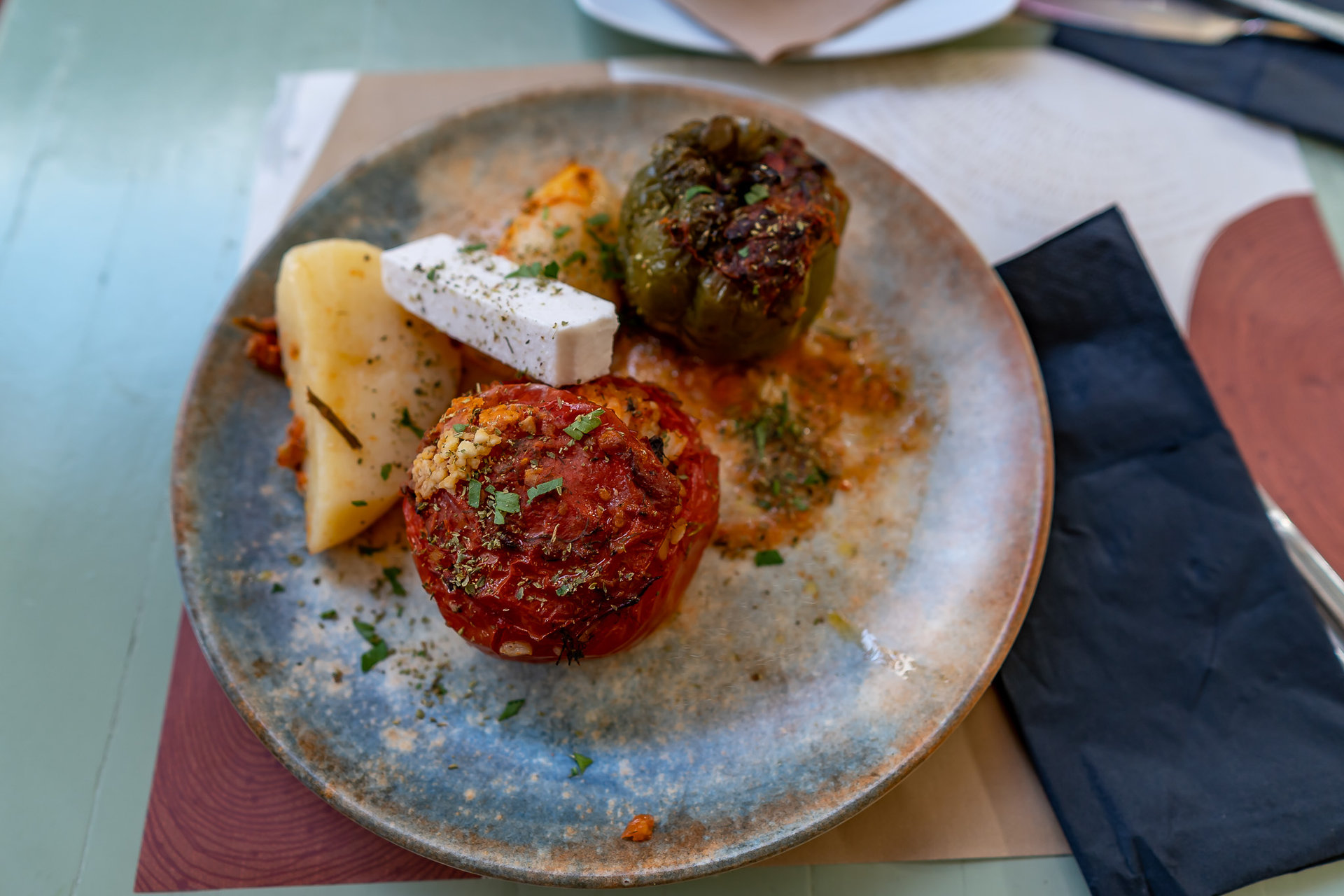
A braised eggplant dish filled with onion, garlic and tomatoes that is similar to Gemista. This is a popular summer menu item served with toasted bread and feta. For vegans, simply omit the cheese and serve with olive oil
A stewed green bean dish that is vegan and packed with flavour; Fasolakia is braised beans on another level. Again, olive oil is critical in this dish, and although it is commonly served as a side to meat, you can always eat Fasolakia with other vegetables, bread or rice.
A baked chickpea stew cooked with lemon, garlic, and onion in a vegetable-based broth. This dish is so adored it even has its cooking dish made from a unique clay pot. The pot is placed on the fire, and the chickpeas are slowly softened over 3 – 4 hours.
Non-Vegan Ingredients In Greek Cuisine
In Greek cuisine, several non-vegan ingredients are used in popular local dishes, including dairy products, chicken broth, eggs and honey. Be sure to check the following ingredients if you are dining at non-vegan establishments:
Cheese is widely used in Greek cuisine and added to different salads, dips, and baked goods. Feta cheese is made from sheep’s milk (or sheep and goat milk) and is not vegan-friendly. It is a trendy ingredient added to salads, desserts and even served pan-fried with bread. It is a staple ingredient in Greek Salad and Spanakopita.
Graviera cheese is often made with cow, goat and sheep’s milk and is the second most popular cheese in Greek cuisine. It is added to baked goods or served on cheese platters. You will indeed find this cheese wheel at the farmer’s market, but it is not a vegan-friendly option. Kefalotyri is commonly added to pasta dishes, cheese sauce, or in stews but also paired with fruit or wine. Made from sheep or goat’s milk, this unpasteurised cheese is also ideal for frying, so be careful to watch out for this hidden non-vegan ingredient in vegetable-based dishes.
Yoghurt is another ingredient in traditional dishes such as dips, sauces, pastries, and desserts. You can find it in several cakes, poured on kebabs or gyros, and served alongside a range of sweet desserts. Made from dairy products (unless certified vegan), it is not a vegan-friendly option. Greek yoghurt is widely used to make dips, baked goods and cakes. Greek yoghurt is a strained yoghurt called Yiaourti in Greek and is used as a base in dishes such as Tzatziki (sauce or dip), Bougatsa (sweet or savoury pastry), and Yiaourtopita (yoghurt cake).
Honey has been used in Greece since ancient times and is now considered an essential part of the national cuisine. Honey is added to desserts, salad dressings, sauces, baked goods and beverages. A popular breakfast dish is honey drizzled over fresh fruit with crushed nuts and Greek yoghurt. Honey is also used to make the well-known layered pastry, Baklava and traditional Christmas cookies called Melomakarona. Common alternatives are agave syrup, grape molasses, date and maple syrup.
Vegan Restaurants In Greece
This vegan-only restaurant serves delicious Greek dishes such as souvlaki, wraps and kebabs. They are highly rated for their mushroom-based meat replacement, offering diners an alternative to traditional meat-centred meals.
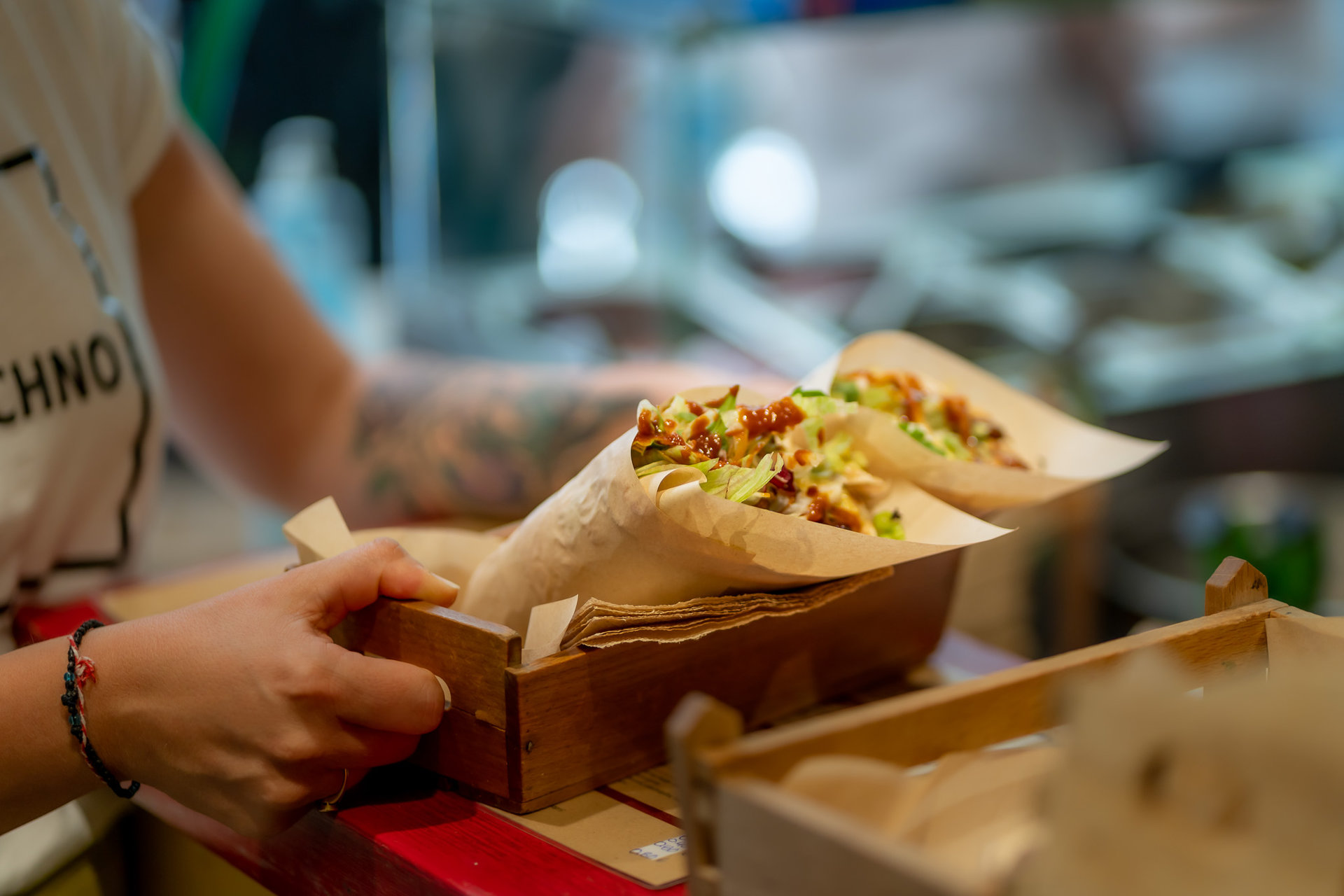
With a 100% vegan menu featuring salads, burgers, pasta, risotto and a selection of plant-based desserts, this is a must-visit restaurant in Crete.
A vegetarian falafel option with vegan menu items, including chunky hot chips and fresh taboule. This establishment has excellent guest reviews and plenty of 5-star recommendations for some of the best falafel in Greece!
A fine-dining restaurant serving traditional dishes based on vegetables, grains, legumes and spices. Select from potato soup, risotto, handmade hummus, fresh-baked bread, seasonal salads, and exceptional desserts.
Focusing on sustainability and healthy street food, this is a must-try menu in Mykonos! Stop by for a vegan burger, wrap or salad bowl with plant-based alternatives such as tofu fried chicken, lentils, rice, beans, pulled jackfruit, oyster mushrooms and tempeh bacon.
Although Bowl is not strictly vegan, they have a wide selection of vegan-friendly smoothie and salad bowls. Swap out the Greek yoghurt for acai berry, and order the vegan breakie bowl or soba noodle salad. A great option for nourishing and organic meals in Mykonos, plus they deliver!
For all things sweet, be sure to visit Sugar Killer for a range of desserts, including ice cream, waffles, doughnuts, chia pudding, smoothies and the best part – it’s 100% sugar-free! Gluten-free, lactose-free, sugar-free and 0% sugar, the menu is decadent yet good for you.
Rated as some of the best vegan food in Greece, Vegan Beat is a must-try street food spot with vegan mushroom gyros topping the list. Fresh, delicious and budget-friendly.
If you are searching for traditional Greek street food that is strictly vegan, then look no further than Mama Tierra Acropolis, right next to the Acropolis Museum. This takeaway-style menu offers a Beyond meat burger, mushroom melt wrap, jackfruit bao buns and plenty of sides and drinks. If you prefer to dine in, check out their vegan restaurant, Mama Tierra Exarchia.
Finding vegan, gluten-free options can be extra challenging, but Veganaki is here to save the day. The entire menu is gluten-free, including the in-house bakery. Previously a street food business, the brand has evolved from vegetarian to 100% vegan with an impressive wholesome menu.
Not gluten-free certified*.
Vegan Hotels Greece
The first 100% vegan hotel in Greece, the boutique Koukoumi Mykonos, is a 5-star vegan dream destination. Complete with a spa, gym, vegan restaurant and incredibly stunning guest rooms, you will not want to check out. Koukoumi serves 100% plant-based Mediterranean and Japanese cuisine, and guests can wake up and enjoy the incredible vegan breakfast buffet.
A vegan accommodation option in Santorini, MOD offers guest rooms for those looking to enjoy the best in sustainability. Wake up and enjoy the 100% vegan breakfast featuring ingredients from local farms in the region, or participate in one of the MOD juice cleanses during your stay. In addition to the menu, all products used in the guest rooms are vegan and cruelty-free.

A newly refurbished hotel is now welcoming guests to enjoy the beautifully appointed standard and deluxe studio rooms. It boasts a vegan restaurant and snack bar, including a vegan breakfast buffet with handmade marmalades and plant-based milk for your coffee. Goji is a family-owned business offering vegan travelers the ideal place to relax just moments away from the beach on the stunning island of Rhodes.
If you want to join a fully vegan getaway and experience all of the plant-based food highlighted in this guide, check out our upcoming getaways in 2024, including a fall trip to Greece coming soon! Find out more on our website here or find us on social media.
Reference List
https://www.cooksinfo.com/byzantine-food
https://www.thenomadicvegan.com/the-nomadic-vegans-guide-to-greece/
https://www.greece-is.com/fasting-and-feasting-the-greek-orthodox-way/
https://theculturetrip.com/europe/greece/articles/10-popular-greek-cheeses-try
https://www.mygreekdish.com/category/collections/traditional-greek-yogurt-recipes/
https://greekreporter.com/2022/05/08/greece-heaven-vegetarians/
